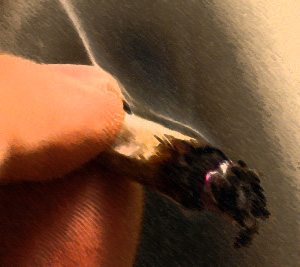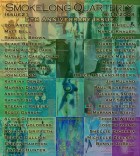There are so many great lines in your story, Evelyn, surprising lines. The last, how you end “Parting,” is just so good—it’s perfect really. Did you write it that way at first draft, or did it take many tries? What does that mean, exactly, “fleshy family”? To me it is quite mysterious, loaded with suggestion.
Thank you for the kind words. The last line was one of the additions I made when I returned to edit the story after leaving it alone for a few weeks. To me the last line expresses something about the discomfort of dealing with the grief of others. It’s a discomfort I associate with adolescence, when emotions and how they manifest via the body can seem awkward and disgusting.
There is excellent verisimilitude in “Parting,” the casual but important details given about the funeral home and its director. Do you have insider knowledge? Do you research your fiction? Is it true, the dead deflect light?
No, no insider knowledge. I don’t usually research my fiction; I’d rather write from daily experience and observation. More than factual correctness, I’m interested in language and form and the feeling of “rightness” that comes from their interaction.
Looking at your story on the page, there is a nearly perfect order to it, with each succeeding paragraph longer than the previous (with one exception). How would you say that building of length contributes to our reading of the story, our understanding of it? Is it too much to say it is like slow the building of a wave? (the last word of the story)
The doubt and tentativeness with which I go into writing any story shows up in the way this story looks on the page. With this story, as things seemed to be working, some doubt went away, and as doubt went away, the sentences formed paragraphs that got longer as the story moved along. I like your idea about the wave metaphor. I didn’t have it in mind as I wrote, though. There was just a sense that things were building.
The topic of this story is death, yet underneath death is sex, the flower hanging over the father’s face, the sister in another state, the funeral director chatting up the narrator’s mother, and, again, the “fleshy family.” What’s going on here? What exactly is the son leaving behind? Death? Family? The messiness of life’s continuance?
Yes, there is the old death/sex thing going on in this story. The son is a character whose desires seemed to me as conflicted and vague as most people’s desires do.
This issue marks SmokeLong‘s fifth anniversary, which has the staff thinking a lot about longevity and growth. There’s no denying the literary arena is fickle, with journals coming and going, writers shooting onto the scene then falling into a long hiatus, editors changing houses, agents merging, trends in what’s hot, what’s not. How do you, as a writer, endure the ups and downs? Have you experienced any setbacks? What measures have you taken to grow?
Congratulations! Five years is an accomplishment considering how both the Internet and the literary scene can change quickly. My personal ups and downs have little to do with what goes on in the literary arena. They’re more related to my doubt in my ability to write anything of interest, and to other things going on in my life. I have decided many times that I’m never going to write again, and then I feel relaxed, and feeling relaxed, I find myself writing better than when I felt I was trying really hard. Maybe constantly giving up is helping me grow? I’m not sure.



 The SmokeLong Grand Micro Contest (The Mikey) is now an annual competition celebrating and compensating the best micro fiction and nonfiction online.
The SmokeLong Grand Micro Contest (The Mikey) is now an annual competition celebrating and compensating the best micro fiction and nonfiction online.